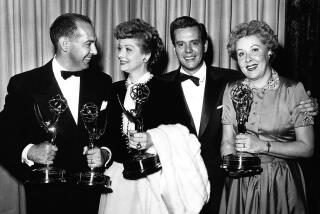Musical Numbers From ‘I Love Lucy’ on Tape
- Share via
The ‘50s TV comedy series “I Love Lucy” continues to be a major home-video attraction. The latest addition to the collection of “Lucy” videos is CBS’ “Babalu Music!,” a 52-minute compilation of some of the musical performances on the show. It sells for $14.98 on video and $29.98 on laserdisc.
Pop-music parodist Weird Al Yankovic--a hard-core “Lucy” fan--was hired to sift through all the shows and come up with numbers for the tape. The final tally: 18 songs, including “Cuban Peete,” “Cheek to Cheek,” “We’re Having a Baby,” “California Here I Come” and, of course, “Babalu”--Ricky Ricardo’s signature song.
Ken Ross, vice president and general manager of CBS-Video, came up with the idea for the program. What led to the compilation was his search for a rare clip of the four “Lucy” regulars dressed as Santa Claus singing “Jingle Bells”--first shown in 1951 as a bonus at the end of the show about Ricky and Fred Mertz being drafted.
Ross finally found the clip in the collection of Lucy Arnaz, the daughter of Lucille Ball and Desi Arnaz. Looking for a way to market the clip, he stumbled onto the idea of the compilation.
Putting the project together wasn’t easy. Getting publisher’s clearances and arranging rights’ fee was, Ross said, a nightmare.
“It took over six months to get all the clearances,” he said. “People don’t realize how tough that can be when you’re dealing with old songs. We hired a firm to help us get what we needed. That was very expensive. We had some problems that forced us not to use certain songs.”
Because of the expense in assembling the program, some thought was given to using fewer songs and charging a higher price. “But we decided on $14.98 for home video, for continuity with the other ‘Lucy’ tapes we have on the market,” Ross explained.
“Babalu Music” will be part of the “Lucy” collection offered by CBS Video. So far, there are 12 cassettes on the market, each including two shows. CBS has been releasing about four cassettes every six months.
Why do people buy these tapes when, in most cities, they can still see the series on TV?
“We offer complete, uncut ver/sions of the most popular episodes,” Ross replied. “The TV versions have all been edited way down to make room for as many ads as possible. Many of the hard-core ‘Lucy’ fans want to see the uncut versions--and see sequences they’ve been missing all these years of watching the edited versions.”
The next “Lucy” release will be sometime next year. “We’ll put out a set of cassettes featuring the shows set in Hollywood,” Ross said, adding that the project is still in the early planning stages.
POTENTIAL PIRACY BOOSTER: Scottsdale, Ariz.-based Go-Video is marketing a new version of its VCR-2, the dual-deck machine that facilitates videotape copying. The VCR-2 has two wells, one for the blank and one for the tape to be copied.
When the first VCR-2 came out in June of last year, it couldn’t copy tapes protected by Macrovision--a coding that prevents making clean copies. But the new GV2010 D--which has been on the market for a few weeks but which is not yet easy to find--reportedly makes clean copies of Macrovision-encoded tapes.
About 400 million tapes--mostly major movies--bear the electronic Macrovision signal, which, more than anything, thwarts renters from making copies. For some people, the ability to easily copy rented movies might be worth the $849 price tag of the new machine.
That’s much cheaper than the original VCR-2, which hasn’t been in great demand, selling about 18,000 so far. The steep price--about $1,000--undoubtedly has been a sales deterrent.
Though Go-Video would appear to be making things easier for would-be video pirates, the company says that it supports copyright laws and doesn’t approve of unauthorized copying. Go-Video’s suggested use for the new VCR-2 is to copy rental tapes for viewing in the home at a more convenient time--a form of time-shifting that, the company argues, would benefit the video rental business.
Bill Krepick, of Macrovision Corp., said that his company would have no comment on the new machine until its representatives were able to test one and see whether it can make copies that are as clean as advertised.
More to Read
The biggest entertainment stories
Get our big stories about Hollywood, film, television, music, arts, culture and more right in your inbox as soon as they publish.
You may occasionally receive promotional content from the Los Angeles Times.










